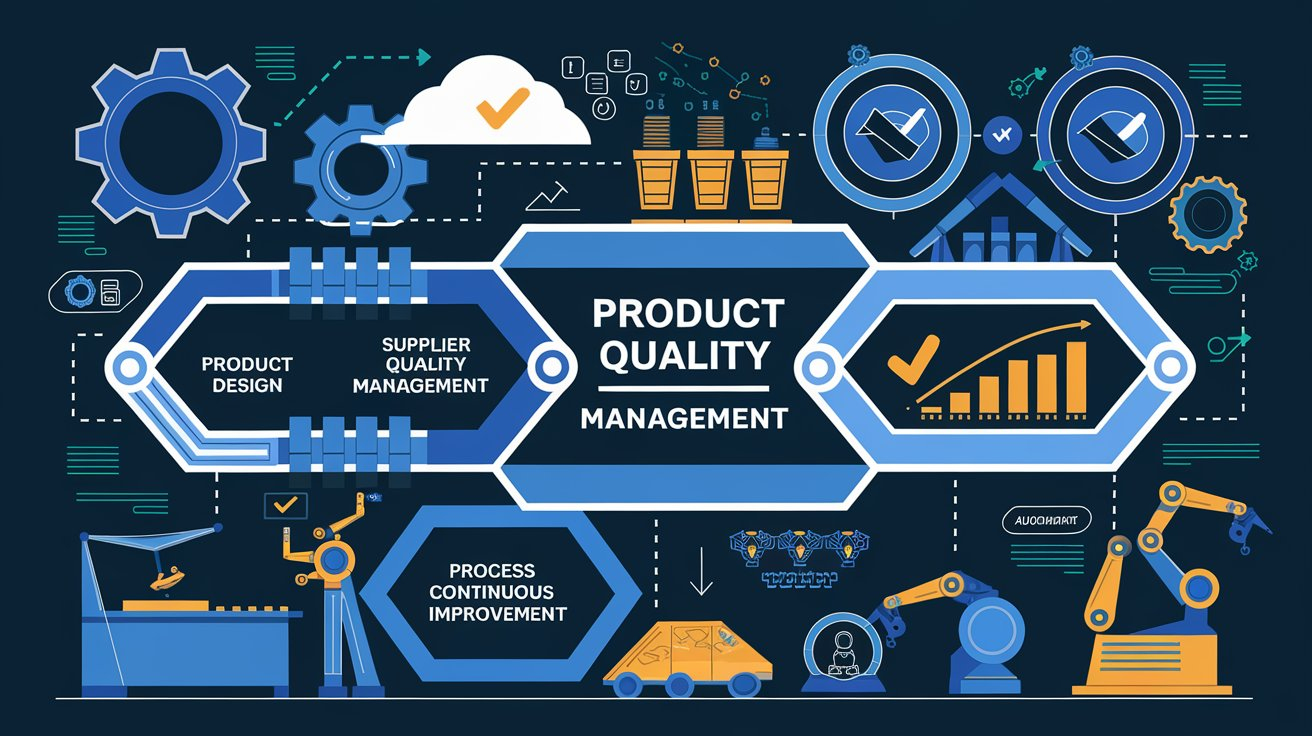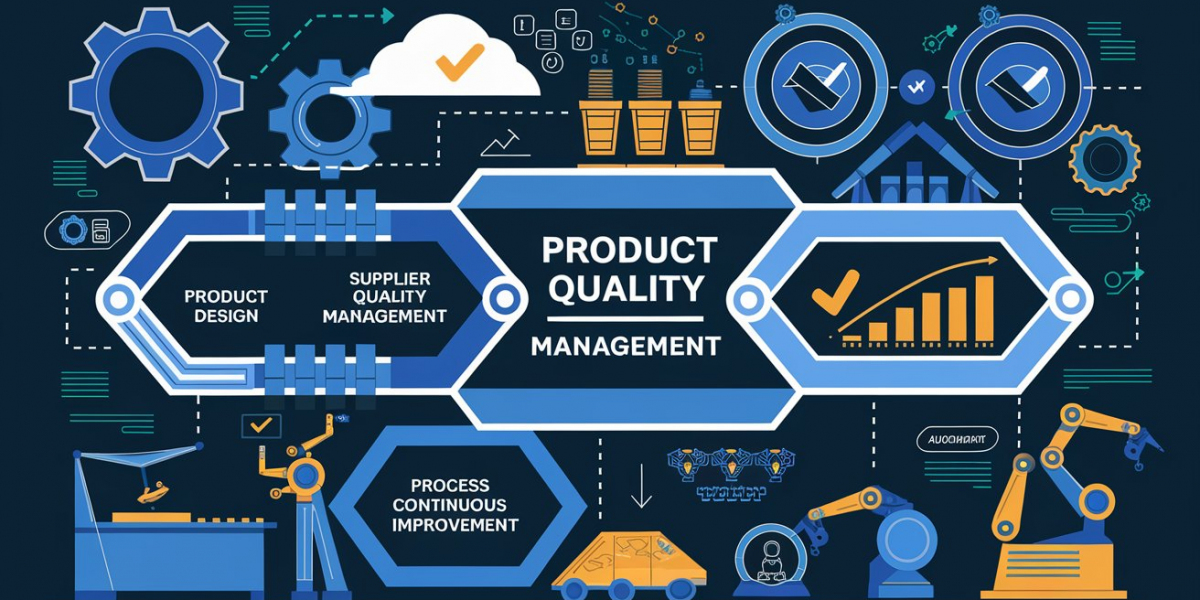
Product quality management refers to ensuring that products meet some standards regarding quality, performance, and reliability. It deals with those processes, strategies, and systems organizations apply in order to pursue a track record of excellent quality in their products. The importance of product quality management is drawn from the fact that its impact is direct toward customer satisfaction, operational efficiency, and competitive advantage. With globalization and rising competition, business survival largely depends on the quality of products; therefore, quality is no longer a target but a prerequisite for survival.
Definition and Scope of Product Quality Management
PQM is the structured management of the process involved in the development and production of a product to meet specifications as well as customer expectations. PQM encompasses everything, from preliminary design and material acquisition to manufacturing processes, testing, and after-sales services. Such a wide scope ensures that each and every stage of a product's life cycle adds up to deliver overall quality. Such quality is critical in preventing defects, saving money, and gaining customer trust.
PQM does not only pertain to manufacturing. In fact, it integrates engineering, supply chain management, marketing, and customer service into a QMS that contains mechanisms of continuous improvement, such as loops of feedback, root cause analysis, and corrective actions. Therefore, with preventive rather than reactive measures, PQM enables companies to face problems about quality before these become major issues.
Main Elements of Product Quality Management
Some of the central elements are, therefore, core in PQM and fundamentally contribute to the overall goal of providing quality products that are in tandem with requirements as well as expectations. These include: product design, supplier quality management, process control, product testing, and continuous improvement.
Product Design:
Quality starts at the design stage. This involves defining the specifications of the product, the selection of materials, and design processes that fit in with the quality goals. Design for Quality is also a very important concept, which discusses designing a product with a focus on minimizing variability, enhancing durability, and ensuring usability. Tools such as Failure Mode and Effect Analysis (FMEA) are commonly used during this stage for early design flaw detection.
Supplier Quality Management:
Suppliers are also one of the main determinants of the overall quality of the product. In the case of supplier quality management, it involves ensuring that the selected suppliers can meet the expected quality standards and checking on their performance at steady intervals. Supplier audits, quality certifications, and performance scorecards are some techniques used to assure high standards. Suppliers will try to develop good-quality raw materials and components with such strong and effective relationships with companies and a mutual teamwork approach.
Process Control:
In every manufacturing process, there has to be some control in order to ensure consistent quality for the final products. This is where SPC tools come in handy in monitoring production processes and, where possible, identifying deviations from the preferred performance. The application of process control techniques helps detect defects and correct them during production. This reduces waste and rework. Maintaining SOPs and high-level employee training are also parts of maintaining process discipline.
Testing of Products:
In most products, testing is crucial in identifying whether the produced products are of acceptable quality for the end-use customers. Mostly, the method followed includes destructive and non-destructive testing, depending on the product being tested. In most cases, testing normally begins at every stage of the production cycle, from the prototypes to the final masses in the production cycle. In most industries, because of regulatory requirements, companies have designed specific testing methods to ensure adherence to safety and performance standards. For example, crash testing and durability tests in automobile companies are significant components of quality.
Quality Management and Continuous Improvement:
Improvement is the cardinal principle of the good management of product quality. This can be done by obtaining improvements through internal audits, customer complaints, and market performance. Total Quality Management (TQM), Lean Manufacturing, and Six Sigma are some of the most widely applied frameworks that allow companies to decrease variability, remove waste, and develop a quality improvement culture. Organizational process review and refinement enable an organization to maintain the highest quality and respond effectively to a constantly changing customer base.
Technology Role in Product Quality Management
Technology plays a role in increasing PQM through the application of more effective and precise quality management processes for companies. Technical advancements in automation, data analytics, and AI capabilities transform how organizations manage control and assurance on quality.
Automation:
Robotics and automation technologies, in the form of robotic process automation and automated inspection systems, greatly enhance consistency and speed in inspections. Automated systems would be able to deal with even difficult tasks at high accuracy without much human error. For instance, AOI systems for printed circuit boards can detect defects in printed circuit boards in the electronics industry with greater precision than manual inspections.
Data Analytics:
With data analytics, companies can gather and analyze enormous volumes of data regarding the quality of a product. High-level statistical and machine learning algorithms can identify trends and patterns that an organization might not recognize through more conventional methods. Predictive analytics, for instance, can enable companies to identify prospective quality issues before they happen, thereby taking proactive steps that keep defects away and minimize downtime.
Artificial Intelligence (AI):
It is transforming the product quality management system by enabling more intelligent and adaptive systems of quality. AI-driven quality management systems may automatically make real-time adjustments in the processes of production based upon data inputs, thus minimizing human intervention. Additionally, defect detection systems, which develop with AI technology, are coupled with image recognition and pattern matching to identify anomalies in a product faster and more accurately than ever before. These developments will bring better quality outcomes while cutting costs by reducing rework and scrap.
Challenges in the Implementation of Product Quality Management
Effective PQM is quite challenging to implement, despite its many advantages, especially for complex and globalized supply chains. Some significant challenges include consistency for geographically dispersed production facilities, managing supplier quality across regions, and the complexity of regulatory compliance in diverse markets. Further, rapid technological advancement requires frequent and significant investment by companies in order to be on the same page with the changing tides and remain competitive.
Additionally, organizational culture may either empower or disable efforts toward PQM. Some of the barriers to the successful implementation of quality management include a lack of commitment from leadership, poor training, and resistance to change. Quality management practice will fail to realize the desired outcome, even when implemented as part and parcel of the most robust quality management systems, without a positive organizational culture embracing quality at all levels.
Dive Deeper: https://axonator.com/request-for-demo/
About Axonator Inc:
At Axonator, our vision is simple yet powerful: to enable the world on mobile. We envision a future where every aspect of business and society is seamlessly connected through mobile devices. Our mission is to empower businesses worldwide to leverage the full potential of mobile technology, transforming the way they operate, communicate, and collaborate.
Contact:
Axonator Inc. (The World On Mobile)
Austin, TX, USA
USA: +1-716-274-8885
India: +91-8600-032-635
Email: support@axonator.com
Website: https://axonator.com/









